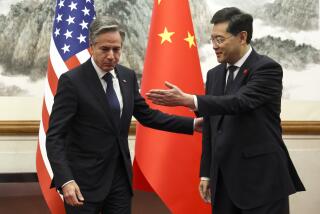3 Ousted Reformists Resurface in Minor Posts in Beijing
- Share via
BEIJING — Three reformist Chinese leaders ousted from power two years ago have been given vice ministerial posts in what amounts to partial rehabilitation, official media announced Saturday.
Most prominent of the three is Hu Qili, 62, a former member of the policy-setting Politburo Standing Committee. In the mid-1980s, Hu was viewed by many Chinese and foreign observers as a likely future head of the Communist Party.
Hu’s new post, as vice minister of machine-building and electronics, is much less powerful than the positions he once held. But it will enable him to emerge from the relative seclusion in which he has spent the last two years.
Also given new jobs were Yan Mingfu, appointed vice minister of civil affairs, and Rui Xingwen, named to be a vice minister of the State Planning Commission. Before being purged, Yan and Rui had held more powerful posts as members of the Communist Party secretariat.
All three men were key reformist allies of former Communist Party General Secretary Zhao Ziyang. They fell from power along with Zhao after army troops were used on June 3-4, 1989, to suppress the Tian An Men Square pro-democracy protests. Zhao had opposed the use of troops and was then ousted for allegedly splitting the party and encouraging the student demonstrators.
Zhao remains under official investigation by the party and is believed to be living under close security guard. He has made no public appearances since losing his post as party chief. It is not clear whether the appointments announced Saturday could help pave the way for Zhao’s eventual rehabilitation or whether they may have the opposite effect of leaving him more politically isolated than ever.
Reformist influence in the government should be strengthened by the appointments of Hu, Yan and Rui. But their reinstatement at this level does not greatly affect the power balance between the more liberal wing of the Communist Party, which they represent, and more hard-line leaders such as Premier Li Peng, a key advocate of the 1989 crackdown.
Especially for Hu, acceptance of a vice ministerial post represents a severe demotion from the positions he once held, even though it could be the first step toward a return to real power.
The appointments are generally viewed as the result of compromises aimed at preserving a facade of unity at the top levels of the Communist Party and government.
More to Read
Sign up for Essential California
The most important California stories and recommendations in your inbox every morning.
You may occasionally receive promotional content from the Los Angeles Times.












